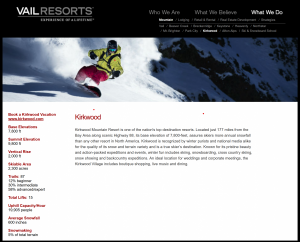The above statement about WB controlling everything is inaccurate. WB owns all mid mountain dinning but the vast majority of the Whistler village is not owned by the ski corp. And there is an elected mayor and town council that were responsible for the original village layout and overseeing of the building and currant operating of the Whistler village.The whole thing is connected, as it directly relates to the business model. If you look at a resort like WB - they control EVERYTHING in mountain, and monetise the whole thing. Whereas somewhere like (for example) Tignes the only thing they really control and monetise is the lifts and slopes.
Big White controls its village and all ski shops are ski corp owned. Nippon Cable owns Sun Peaks and basically started from scratch in 1992 to build a community at Sun Peaks and allowed independent owned ski shops and other retail stores. The SP Ski Corp owns 1 hotel, 8 retail shops and 7 restaurants/snack bars, with everything else independently owned.
The provincial government eventually created the Resort Municipality of Sun Peaks with an elected mayor and council and with the SP Ski Corp getting their own appointed seat on the town council.
All of the ski resorts in B.C. started out as small local hills (often on the lower reaches of a large mountain) that served local skiers in a nearby town.
All of B.C. ski resorts are built on "Crown Land" owned by the provincial government, not the feds, and historically every provincial government whether they be politically left or right leaning, are pro ski area expansion. The business model is such that the government approves a long term master plan, and since the government still owns the land and the trees that are cut to create runs, they get paid a logging stumpage fee when new runs are cut. This give the Provincial Forest Service incentive for logging plan approval.
As far as village or base facilities go, the ski corp pays for sewer, road, electric infrastructure and then the provincial government sells that land to the ski corp at below market price. The ski corp can then build lodging, shops and houses or sell the land to real estate developers at a profit.
Most of the ski resorts in B.C. are foreign owned and independent with afaik only Whistler being majority owned by a publicly traded on the stock market company.
The low value Cdn dollar makes skiing in Canada relatively cheap, but air travel is not. The small 5M population of B.C. (with 2.8M living in and around Vancouver) means that every resort not named Whistler is not crowed.
Last edited:


 I just added a little bit there, because one of my grandmas was a Brit and that’s how she fixed beef, claiming it was heritage.
I just added a little bit there, because one of my grandmas was a Brit and that’s how she fixed beef, claiming it was heritage. 